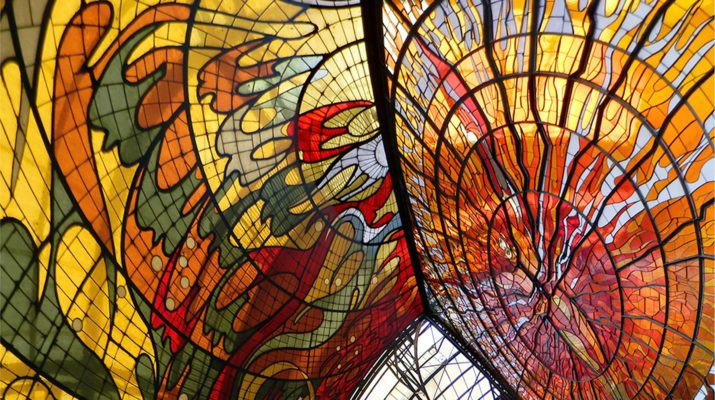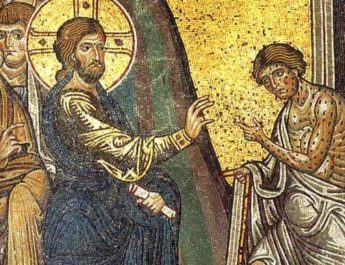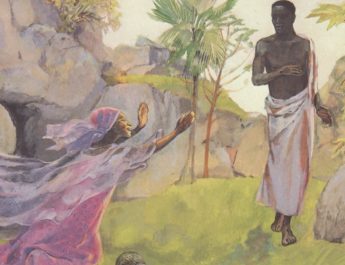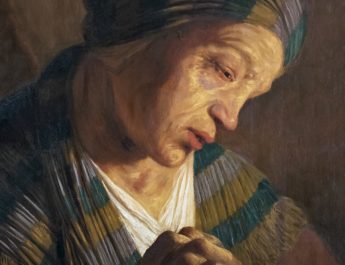Psalm 11
A “leader” = natsach. Properly, something that glitters from a distance. So, something that stands out, excels, has status/standing (such as a chief musician or superintendent of Temple services). This can also mean to be permanent or enduring.
B “David” = david. From the same as dod (beloved, love, uncle); the root may mean to boil, which is used figuratively to describe love. So, this implies someone you love such as a friend, a lover, or a close family member like an uncle. David’s name likely means something like “beloved one.”
1 In the LordC I take refuge;D how can you say to me,E
“FleeF like a birdG to the mountains;H
C “Lord” = YHVH. From havah (to be, become) or hayah (to come to pass, become, be). This is the name of the God of Israel, the self-existent and eternal one, the tetragrammaton. This pronunciation has been lost to time so “Lord” is generally used in its place.
D “take refuge” = chasah. This is to take refuge or flee for protection. Figuratively, it means to hope or trust in someone or something.
E “me” = nephesh. Literally “my soul.” Related to naphash (to refresh or be refreshed). This is soul, self, person, emotion. It is a breathing creature. Can also refer to appetites and desires.
F “flee” = nud. This is to nod, waver, wander, flee, show grief, disappear. It can be nodding the head as a sign of sympathy or consolation. It could also be tossing one’s head to show contempt or to taunt.
G “bird” = tsippor. From tsaphar (to skip about, maybe to depart). This is a little bird like a sparrow – a little bird as one that hops about.
H “mountain” = har. Literally “your mountain.” This is a mountain or hilly land.
2 for look,I the wickedJ bendK the bow,L
they have fittedM their arrowN to the string,O
I “look” = hinneh. From hen (lo! Behold! If, though; an expression of surprise). This is to draw attention, show suddenness or surprise, or to emphasize the importance of the coming statement. See! Lo! Behold!
J “wicked” = rasha. This is to be wicked, guilty, make trouble, do wrong. It can also be condemn, guilty, inflict punishment. This verb implies disturbing or violating.
K “bend” = darak. This is to tread, march, to walk. Can also mean affixing a string to a box since one needs to step on it to bend it in the process. So, also an archer.
L “bow” = qeshet. Perhaps from qush (to set a trap, lure, ensnare) OR from qashah (to be fierce, cruel, dense, tough, severe). This is a bow, arrow, or archer. Bow can be used figuratively for strength.
M “fitted” = kun. Properly, this means in a perpendicular position. So, it is set up in a literal sense – establish, fix, fasten, prepare. In a figurative sense, it is certainty, to be firm, faithfulness, render sure or prosperous.
N “arrow” = chets. From chatsats (to divide, chop, pierce, distribute, shoot an arrow, an archer). This is an arrow or archer, shaft, staff. Properly, it is someone or something that pierces, such as an arrow. It can imply a wound. Used figuratively of God’s thunder bolt.
O “string” = yether. From yathar (this is to jut over, remain behind, preserve, to excel). This is a remainder or excess. It can imply abundant or superiority. Additionally, it can be cord a free-hanging rope.
to shootP in the darkQ at the uprightR in heart.S
P “shoot” = yarah. This is to throw, shoot, be stunned. It is to flow as water so figuratively to instruct or teach. This is the same root that “Jerusalem” and “Torah” draw from.
Q “dark” = ophel. 9x in OT. Perhaps from the same as aphel (gloomy – unused root which refers to the sun setting i.e. dusky, dark). This is darkness, gloom, dusk, obscurity.
R “upright” = yashar. From yashar (to be straight, right, even, smooth, or agreeable; figuratively, to make something pleasant or prosperous). This is straight, right, level. Also, it is pleasing, whether pleasing God or pleasing other people. So, it is upright or righteous.
S “heart” = leb. May be related to labab (to encourage; properly, to be encased as with fat; used in a good sense, this means to transport someone with love; used in a bad sense, it can mean to dull one’s senses). This is the heart, courage, one’s inner self, the mind, or the will. Heart is only used in a figurative sense in the Old and New Testaments.
3 If the foundationsT are destroyed,U
what can the righteousV do?”W
T “foundations” = shathah. 2x in OT. From shith (to place, set, bring, appoint, consider, bring, array or look). This is a foundation or pillar. Figuratively, it can refer to any kind of basis or support.
U “destroyed” = haras. This is to break down, throw down, ruin, overthrow, or destroy. It is breaking down in pieces.
V “righteous” = tsaddiq. From the same as tsedeq (rightness, righteousness, just cause, vindication; that which is right in a natural, moral, or legal sense; abstractly equity; figuratively prosperity). This is just, innocent, righteous, righteous one, or lawful.
W “do” = paal. This is to do, make, work, or accomplish. Generally refers to regularly repeated or systematic action – so, to practice.
4 The Lord is in his holyX temple;Y
the Lord’s throneZ is in heaven.AA
X “holy” = qodesh. This is set apart and so sacred. God is different from us and so God is holy/set apart. Things we dedicate to God’s service are set apart for God and so they, too, are holy, etc.
Y “temple” = hekal. Perhaps from yakol (to be able, endure, overcome, prevail). This is a large building with public access such as a palace or temple.
Z “throne” = kisse. From the same as kese (full moon); perhaps from kasah (to cover, conceal, overwhelm; to cover as clothes do or to hide a secret). This is throne – a seat that is covered or has a canopy. Thus, it is a seat that conveys authority.
AA “heaven” = shamayim. Root may mean being lofty. This is sky, the air, or heaven. It is in a dual noun form so this might refer to the part of the sky where the clouds move on the one hand and the part beyond that where the sun, moon, and stars are on the other hand.
His eyes behold,BB his gazeCC examinesDD humankind.EE
BB “behold” = chazah. This is to gaze at – to see or behold. It can also refer to perceiving as a mental process or looking at something with pleasure. It can be used particularly to mean seeing a vision.
CC “gaze” = aphaph. 10x in OT. From uph (to fly, flee, shine, be weary, be faint); perhaps from oph (bird, flying animal). This is an eyelid or eyelash as something that flutters. So, it can refer to a gaze. It can also be used to refer to the dawn light.
DD “examines” = bachan. This is to examine, test, or prove – as one tests metals. It can also be used literally or figuratively for investigating or trying.
EE “humankind” = ben + adam. Literally “children of Adam.” Adam is perhaps from adam (to be red, make ruddy); related to adamah (ground, dirt, earth). This is man, humankind, also Adam’s name. It refers to a human individual or humanity.
5 The Lord tests the righteous and the wicked,
and his soulFF hatesGG the lover of violence.HH
FF “soul” = nephesh. Same as “me” in v1. See note E above.
GG “hates” = sane. This is an enemy or foe. It is one that is hated with a personal hatred.
HH “violence” = chamas. From chamas (to violate, do violence, to wrong; implies mistreatment). This is violence, cruelty, damage, wrong, injustice, or unrighteous. Violence implies a wrong done. The term is also used to describe unjust gain.
6 On the wicked he will rain coalsII of fire and sulfur;JJ
a scorchingKK windLL shall be the portionMM of their cup.
7 For the Lord is righteous;
he loves righteous deeds;NN
the upright shall behold his face.
II “coals” = pach. From pachach (to trap, lay a net). This is a snare or bird trap. It can also refer to a sheet of metal hammered into a thin plate.
JJ “sulfur” = gophrith. 7x in OT. From the same as gopher (a gopher tree or gopher wood – used for construction; perhaps the cypress; root may mean to house). This is cypress resin or brimstone. This could be understood as sulfur since both substances are similarly flammable. This is where the “gopher” in gopher wood comes from.
KK “scorching” = zalaphah. 3x in OT. Perhaps from za’aph (to be angry, rage, fret; this is to boil up and so figuratively being angered). This is burning or burning heat. Figuratively, it is strong indignation or horror – a scorching wind or a consuming famine.
LL “wind” = ruach. This is breath, wind, air, cool, spirit. This is wind, which resembles the breath and so this can be used figuratively for life itself or being frail/mortal/impermanent. It can refer to the air of the sky or the spirit.
MM “portion” = menath. 7x in OT. From manah (to weigh out, reckon, count, number, set, tell; by implication, it is allotting or providing something officially). This is portion or prey. It is any kind of allotment, whether personal, legal, or of fate.
NN “righteous deeds” = tsedeqah. Related to “righteous” in v3. From the same as tsedeq (see note V above). This is righteousness, justice, righteous acts, and moral virtue.
Image credit: “Cosmovitrail” by Leopoldo Flores in Toluca, Mexico, 1978-1980.




